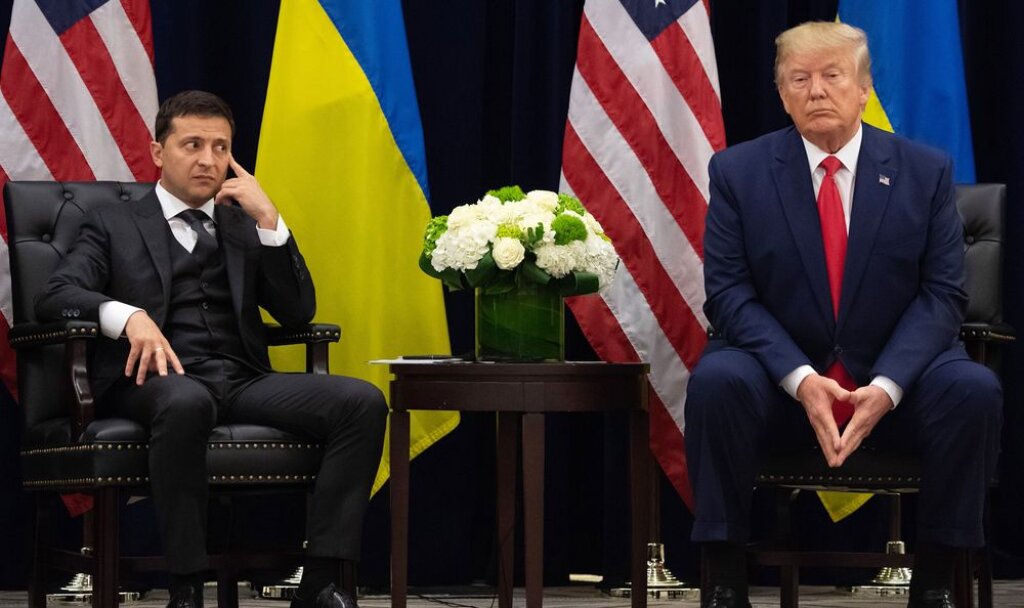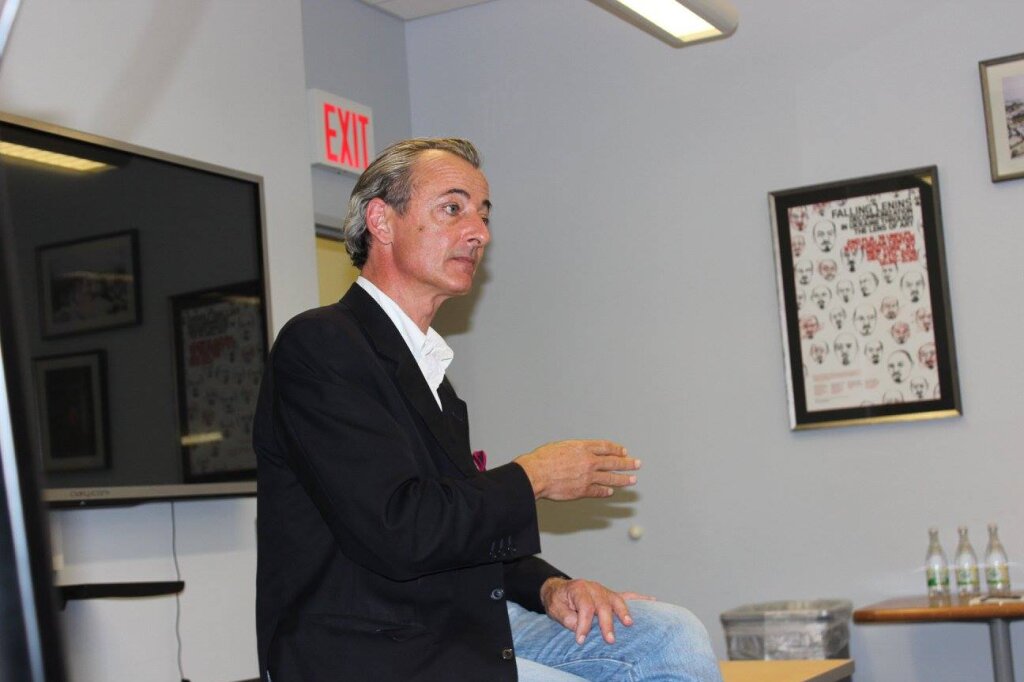Amid the ongoing impeachment scandal, the perspective from Ukraine has largely gone unnoticed. On January 23rd, as part of its New York City -- Russia Public Policy Series in collaboration with Columbia University’s Harriman Institute, the Jordan Center hosted a panel of experts to consider what the scandal could mean for Ukrainian citizens, Ukraine’s relations with Russia, and Russia and Ukraine’s relations with the U.S. moving forward. The talk was moderated by Joshua Tucker, Jordan Center Director and Professor of Politics at NYU, and Alexander Cooley, Professor of Political Science at Barnard College and Director of the Harriman Institute.
The scholars spoke in turn before entering a group discussion. Olga Onuch, who is a Senior Lecturer in Politics at the University of Manchester, opened the talks by presenting a series of slides featuring statistics that sought to explain why conversations regarding the impeachment scandal have been almost entirely absent in the Ukrainian public. “To understand the Ukrainian perspective on the impeachment, we must understand ordinary Ukrainians, and what they have lived through over the past six years,” Professor Onuch said, accenting the numerous domestic affairs that have recently blighted former Soviet republic, including the 2014 coup of former President Yanukovich, the annexation of Crimea, and the ongoing war with Russian-backed separatist in Eastern Ukraine. Until the recent election of Donald Trump, the United States has been an important partner and ally of Ukraine throughout this tumult. And while a strong 34 percent of Ukraine’s population has expressed a desire to emigrate since the events of 2014, a very small portion of those have interest in emigrating to the United States. Instead, the most desired destination for emigration is Germany, followed by Poland, and then the Czech Republic.
Professor Onuch then displayed statistics that illustrated the Ukrainian public’s opinions on domestic issues, from corruption to poverty, and to war. The statistics showed that 74 percent of the population believe corruption plagues the state agencies, while 54 percent believe their financial situation is “deteriorating.” Such conditions created the context in which current President Zelensky and his party won a landslide election in 2019. “We have not seen in Ukraine a victory of this nature,” Onuch said, highlighting the immense support enjoyed by Zelensky and his party, who understood that corruption and poverty were at the heart of Ukrainian concerns.
US President Donald Trump, however, grossly misunderstood Zelensky’s priorities, forgetting that the country had other substantial partners in Western Europe and Canada handing out military aid. According to information Professor Onuch gathered from Zelensky party insiders, the party was prepared for financial support to be leveraged for some kind of benefit. They could not foresee, however, that it would be military aid at a time of immense military conflict in exchange for “something that was clear to be personal benefit.” In the end, two groups emerge looking bad in the eyes of the Ukrainian public: the Poroshenko-led old guard associated with corruption, and Trump and his administration. Donald Trump’s administration were, according to Professor Onuch, wrong to believe they were dealing with “a naive head of state.” A Ukranian newspaper headline, that reads “Servant of the People Caught in a House of Cards,” embodies the Ukrainian perspective on the situation. And while Zelensky emerges a hero and Trump a manipulative politician, the consequences, according to Professor Onuch, could be much “more global than local,” as nations across the world could begin to feel that they could resist American leverage of military aid.
Jordan Gans-Morse, Associate Professor of Political Science at Northwestern University, spoke second, picking up right where Professor Onuch’s presentation left off by displaying a survey of the Ukrainian public’s reaction to the scandal he had conducted with two other scholars the previous week. Because it was taken through mobile phones, the survey is only representative of citizens who are typically younger than 60 and live in cities of 50,000 or more. The first question dealt with the public’s awareness of the impeachment scandal, and an 89 percent of respondents, who became the focus group of Professor Gans-Morse’s talk, said they had at least heard of the scandal.
Before displaying any further results, Professor Gans-Morse provided his takeaway from the overall situation: “The biggest irony of [the scandal] is that Trump asked Zelensky, a president who based his reputation on fighting this type of thing, to do something that is so typical for the post-communist world in terms of a politicized judicial investigation.” The first survey question dealt with whether or not the events damaged Zelensky’s domestic reputation as an anti corruption warrior, to which the majority answered that it didn’t. Based on further results, the majority of Ukrainians also believe that scandal’s effect on U.S.-Ukraine relations isn’t all that harmful, while America’s reputation in the eyes of Ukrainians remains largely unchanged. Supporters of former President Poroshenko believe that the perception of the U.S. as a country that values checks and balances has actually strengthened.
Another set of questions dealt with the capabilities of the Ukrainian populace to decipher truth from misinformation. The first question asked whether the impeachment process started with the Zelensky-Trump phone call –– many respondents believed this to be true. Another curveball question asked whether or not Hillary Clinton’s leaked emails played some sort of role in the scandal, to which many responded that they didn’t believe it. When asked if Hunter Biden was engaged in a corruption scandal with Burisma Holdings, the majority of respondents said they believed it, while ceding that Donald Trump’s push for Zelensky to investigate was ordinary. Both of these answers, Professor Gans-Morse argued, stemmed from a certain Ukranian “cynicism about the way politics work.” According to these results, Gans-Morse believes that the online Ukranian populace generally seems to have a grasp on what’s true and what isn’t.
The third speaker, Oxana Shevel, who is an Associate Professor of Political Science at Tufts University, began by echoing professor Onuch’s point that the fixation on impeachment comes largely from the West. Professor Shevel then segued into introducing the two issues that Zelensky built his campaign around: combating corruption, and ending the conflict in Donbass.
The large swathes of support across all of Ukraine’s regions demonstrated that both of these issues resonate widely with the population. According to Professor Shevel, Zelensky's defeat of corruption domestically could have a wider effect on post-Soviet countries, emboldening democracy in a region that often justifies authoritarianism as a means to regulate the economy. “Since 1991,” Professor Shevel said, “the trade-off between stability and economic success, and political competitiveness, has been evident in many countries across the [post-Soviet region].” The Yeltsin era in Russia, for example, defined by its press freedom and political plurality, was also a period of severe economic crisis, which paved the way for Vladimir Putin’s stance that excessive political freedoms and improved living conditions simply can’t coexist. The potential success of the democratically-elected Zelensky in rooting out corruption and improving living standards, could, according to Professor Shevel, make a strong case against justification for the managed democratic model operating in many post-Soviet countries.
For Professor Shevel, the data Professor Gans Morse presented that indicated the Ukrainian populace’s continued belief in the U.S. as a country of rule of law was “an encouraging sign,” as authoritarian-leaning countries often spew the cynical narrative that Western governance “is no better than their own.”
Professor Shevel then characterized the double-edged nature of Zelensky’s reforms. On the one hand, the elimination of immunity for members of parliament is a surefire way to monitor corruption. On the other hand, the legislature is often the main force of opposition against authoritarianism, but removing immunity no longer protects politicians from facing false corruption charges if they choose to express dissent. And while Zelensky increased prosecutorial power to help in his crusade against corruption, the general prosecutor is a close “man of Zelensky” –– a problematic fact that could pave the way for a future authoritarian abuse of power. In the finale of her talk, professor Shevel outlined the compromises Zelensky has, and has not made in regards to Donbass, pointing to an overall slow yet positive approach to the conflict.
While the war in Eastern Ukraine is a widely-resonant issue, Ukrainians themselves “aren’t ready to compromise everything.” Zelensky was, however, able to achieve success with a prison swap, and his public admittances that he does not always see eye-to-eye with Vladimir Putin, especially when it comes to the federalization of certain parts of Ukraine, has received praise from the Ukrainian populace. Furthermore, Zelensky has made it clear that he doesn’t yet see the war in Eastern Ukraine as a frozen conflict; rather, the war is a priority matter that needs to be resolved urgently. Many experts still argue about the degree to which Ukraine actually needed additional military aid from the U.S. to deter Russia. But according to Professor Shevel, the U.S. certainly missed its chance to play the role of a mediator in the conflict; “what transpired instead, was far more problematic,” she said.
Dr. Keith Darden, an Associate Professor at the School of International Service, closed the talks by sounding the alarm about the possibility of a souring in U.S.-Ukraine relations in light of new revelations about the Ukrainian government’s active participation in the Trump administration’s demands. Back in the fall of 2019, during the initial impeachment proceedings, Professor Darden felt that “Ukraine was untouchable”: democrats had painted the country as a vital U.S. national security interest, and a victim of Trump’s manipulation that continues to behave virtuously, while the Republicans also believed that the country needed support in order to bolster the narrative that relations haven’t been damaged by the U.S. president’s actions.
Yet, according to Professor Darden, the more recent revelations completely throw shade on the idea that Ukraine was a country “that needs help.” The messages located in Lev Parnus’ WhatsApp account, expose a plan between the Poroshenko administration and Mayor Guilianni to compile dirt on Hunter Biden that dates back to the fall of 2018 –– before Zelensky’s ascent to presidency. Although Professor Darden noted that Zelensky’s administration represents a new government, a continuity of certain personnel from the Poroshenko government doesn’t entirely absolve Zelensky’s cabinet from complicity. Moreover, it is now apparent that the Ukrainian government conspired against U.S. diplomats, particularly when Yury Lutsenko asked for Maria Yavonovich to be fired for being too critical of his anti-corruption efforts.
Such actions, coupled with the Ukrainian government’s outreach “to produce materials they wanted,” strongly puts into question the victim narrative the nation has garnered international support for thus far. The evaporation of this narrative could tarnish the U.S. relationship with Ukraine, and a potentially incoming democratic White House could not be so forgiving towards the nation. The victim narrative, Professor Darden argued, is “vital for the country’s survival.” And once Ukraine is no longer perceived as a constant casualty of Russian aggression, and other transnational forces beyond its control, it becomes a country where “you can buy anything.” Donald Trump, for one, believed he’d be able to bargain with President Zelensky because he had already initiated an inquiry through the previous administration. Beyond the problematic thwarting of the victim narrative, Professor Darden argued that the organizations that spewed that narrative are slowly diminishing in Washington. The Atlantic Council think tank, for one, has taken money from the Ukrainian Burisma Holding company; “it begins to resemble a pay to play system, lobbying for international influence,” Professor Darden said. A loss of expertise, in a field that already had very sparse expertise, could prove to be damaging on the future of U.S.-Ukraine relations. The one consolation, according to Professor Darden, is that Zelensky seems to be creating a “good government.”
Following the individual presentations, moderator Alexander Cooley stressed the importance of acknowledging the transnational nature of using money to bolster and lobby think tanks, and asked the speakers what particular issues they’d like more light shined on as a result of some newly unveiled information. Professor Darden answered the question first, saying that he’d like to see more transparency regarding the movement of money into think tanks and other expert organizations. Even the Atlantic Council, which often publishes its donors, is still quite vague about its funding. “It’s problematic to be contingent on non-democratic regimes supplying resources to study those very regimes,” Darden said, adding that he believes more federal, taxpayer money should be the main source of income for these think tanks. Professor Onuch responded by saying that the academic sphere on Ukraine, many of whom perpetuate the problem by working directly for political actors and agencies, “needs a reality check” ; “it’s not just all the evil lobbyists out.” Professor Shevel mentioned that she would like to know more about how the rationale among the Poroshenko politicians who involved themselves in Trump’s schemes, and what compelled them to believe that money and lobbying can actually win them results. Professor Gans-Morse believed that the most revelatory element of this scandal was the degree to which the United States involved itself in corruption in a country where corruption levels run high, and stressed that such behavior of the U.S. should be researched globally.
Moderator Joshua Tucker then asked how Zelensky can sustain his popularity as an anti-corruption crusader, emerging from the situation with an unscathed reputation, especially considering his lack of political expertise. Professor Gans-Morse explained the phenomenon in two points: Ukrainians have more things to think about beyond the impeachment scandal, and the more cynical take that the population has a very low bar for politicians. Professor Onuch claimed that academics, experts, and the Ukranian elite, all misjudged Zelnesky’s capabilities; the reality is that he was always a “shrewd businessman” who built a good political team around him. “Alienating him and the electorate can prove to be dangerous,” Professor Onuch stressed. Professor Shevel echoed that Zelensky’s absence of ideological convictions, such as a far-right anti-immigrant stance or a strong leftist fiscal model, allowed him to unite the populace over his two key issues. Likewise, a political landscape which doesn’t possess a strong opposition to him allows his popularity to continue to surge. Professor Darden concluded the round of questions by pointing out how Zelensky was always honest about the difficulty of transforming a society, but has always made it his intent: “it’s not about results, it's about the popular perception of intent.” To compensate for his political shortcomings, he has selected a team of experts to help him carry out his mission.



